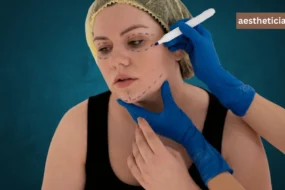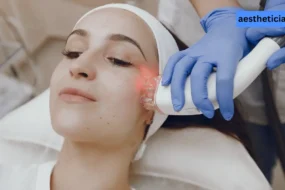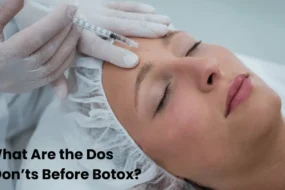
An esthetician is a skincare professional trained to enhance skin health through specialized treatments like facials, exfoliation, and acne care. Unlike dermatologists, estheticians focus on non-medical skincare solutions to improve skin texture, hydration, and appearance.
Whether you’re struggling with breakouts, dull skin, or anti-ageing concerns, an esthetician can create a customized skin care plan to suit your needs. From luxury spas to medical clinics, estheticians work in various settings, helping clients achieve healthy, glowing skin.
If you’re curious about professional skincare or considering a career in esthetics, this guide will cover everything you need to know.
What Does an Esthetician Do?
An esthetician is a licensed skincare professional who performs skin treatments like facials, and acne care. They enhance skin health and appearance through personalized, non-invasive techniques.
The Role of an Esthetician
An esthetician is a licensed skincare specialist who provides treatments like facials, chemical peels, microdermabrasion, and LED light therapy to improve skin health. They analyze skin conditions and recommend the best skincare routines based on individual needs.
Unlike dermatologists, estheticians focus on non-invasive treatments for acne, aging, and hydration. They work in spas, medical clinics, and beauty salons, offering hair removal, exfoliation, Monthly Facial plans, and customized skincare consultations.
Whether you need a professional skincare routine for acne or want to try anti-aging treatments, an esthetician helps you achieve healthy, glowing skin with safe, effective techniques.
How to Become a Successful Esthetician
Becoming a licensed esthetician starts with completing an esthetician training program at an accredited school. These programs cover facials, skincare treatments, hair removal, and exfoliation techniques.
Once training is complete, you’ll need to pass a state licensing exam to begin practicing legally. Some estheticians choose to specialize in medical esthetics, holistic skincare, or advanced treatments like microdermabrasion and LED therapy.
Many clients also seek professional skincare advice Before Botox treatments to prep their skin properly—making estheticians a trusted part of the process. Success in this field requires hands-on experience, strong communication skills, and a passion for skincare. Whether working in a spa or clinic or as a freelance esthetician, continuous learning and staying updated on skincare trends can help grow your career.
Business & Marketing for Estheticians
Effective business and marketing strategies are essential for a licensed esthetician to thrive. Whether you work in a spa or medical clinic or start your own skincare business, having an online presence helps attract clients.
A professional website with service descriptions, skincare consultations, and online booking options makes it easy for potential clients to connect.
Using SEO strategies, social media marketing, and skincare blogs, you can showcase expertise in facials, acne treatments, chemical peels, and anti-aging skincare. Sharing before-and-after photos, skincare education and client reviews help build credibility, while loyalty rewards, special offers, and seasonal deals boost client loyalty. Staying updated on beauty industry trends and advanced esthetician treatments helps you stand out in the competitive skincare market.
The Best Treatments in the Industry Today
Estheticians provide a variety of skin-related treatments to enhance skin health and appearance. Here are some options:
- Facials – Deep cleansing, hydration, and skin rejuvenation
- Chemical Peels – Helps with acne, fine lines, and hyperpigmentation
- Microdermabrasion – Exfoliates dead skin cells and gives a smoother complexion
- LED Light Therapy – Reduces inflammation and signs of aging
- Laser Facials & Microneedling – Stimulates collagen production and skin renewal
- Hair Removal Services – Includes waxing, and laser hair removal
- Holistic Treatments – Natural skincare options like lymphatic drainage facials
Whether you need an anti-aging treatment, acne solution, or a customized skin care plan, an esthetician can help you achieve healthy, glowing skin.
Choosing the Right Esthetician – What Clients Should Look For
Finding a licensed esthetician who understands your skin care needs is essential for achieving healthy, glowing skin. Look for professionals with certifications in facials, chemical peels, acne treatments, and anti-aging skincare.
A good esthetician will assess your skin type, provide a customized skin care consultation, and recommend treatments like microdermabrasion or LED light therapy based on your concerns. Check online reviews, client testimonials, and before-and-after photos to gauge their expertise.
Avoid estheticians who offer procedures beyond their scope. Whether you need acne care, hydration, or hair removal, choosing the right esthetician ensures safe, effective results.
Estheticians and the Future of Skincare
The skincare industry is evolving, and estheticians embrace advanced treatments and technology to deliver better results. AI-powered skin analysis, LED light therapy, and non-invasive anti-aging treatments are becoming more popular.
Sustainable and eco-friendly skincare is also rising, with many estheticians offering organic facials and cruelty-free products. Innovations like microneedling, and chemical peels help improve skin texture, acne, and hydration more effectively.
As demand for professional skincare treatments grows, estheticians stay updated on beauty trends to provide personalized skincare solutions for all skin types.
Expert Tips for Maximizing Skincare Results
To achieve the best results from esthetician treatments, follow these expert skincare tips:
- Follow a Daily Skincare Routine – Cleanse, moisturize and use sunscreen to prevent UV damage and premature aging.
- Prepare Before Treatments – Avoid harsh exfoliants before facials, chemical peels, or microdermabrasion to reduce irritation.
- Follow Post-Treatment Care – Hydrate and use recommended skincare products to maintain results.
- Stay Hydrated & Eat Nutrient-Rich Foods – Helps improve skin texture, hydration, and glow.
- Use Active Ingredients – Incorporate antioxidants, retinol, and hyaluronic acid for long-term skin health.
- Schedule Regular Esthetician Visits – Professional care ensures healthy, glowing, youthful skin over time.
Common Myths About Estheticians and Skincare
There are many misconceptions about estheticians and professional skincare treatments. Some believe that facials, chemical peels, and microdermabrasion are only for luxury. Still, they help with acne, anti-aging, and hydration.
Another myth is that esthetician treatments are only for women. Customized skincare routines benefit men as well. Many think drugstore products work just as well as professional skin care products, but estheticians use high-quality, medical-grade formulations for better results.
Lastly, estheticians are sometimes mistaken for dermatologists. Still, they focus on non-invasive treatments to improve skin health and appearance safely and effectively.
FAQ’s
Q: What is The Job Description of an Esthetician?
Estheticians are licensed professionals who provide skincare services such as facials, waxing, hair removal, and makeup applications. They work in spas, clinics, salons, or with dermatologists, helping clients maintain their personal appearance.
Q: What is the Main Function of an Aesthetician?
An aesthetician focuses on skincare treatments to enhance skin appearance. They work with clients to understand skin type, address concerns, and create a plan using tailored products and treatments to help meet the client’s needs.
Q: What do Estheticians Make the Most Money Doing?
Estheticians often earn the highest income in specialized roles like Hair Removal, Tanning, Medical Esthetician, or Injection Specialist. Positions such as Lead Esthetician, Skin Care Specialist, and Wax Specialist also offer lucrative opportunities due to their advanced skills and client demand.
Conclusion
Estheticians play a vital role in skin care health, offering treatments such as facials, chemical peels, microdermabrasion, and LED light therapy to address concerns such as acne, anti-aging, and hydration.
Whether you need a customized skincare routine or professional advice on skincare products, a licensed esthetician can help you achieve healthy, glowing skin. Staying consistent with skincare treatments and daily routines ensures long-term benefits.
As the skincare industry evolves, estheticians provide safe, effective, personalized treatments to meet individual needs. Investing in professional skincare services is the key to maintaining radiant and youthful skin.
One blog post at a time, Dr.Jeffrey illuminates the route to glowing skin. As a result, her legacy as a skincare writer is growing, creating an enduring impression on the beauty and wellness industry.





